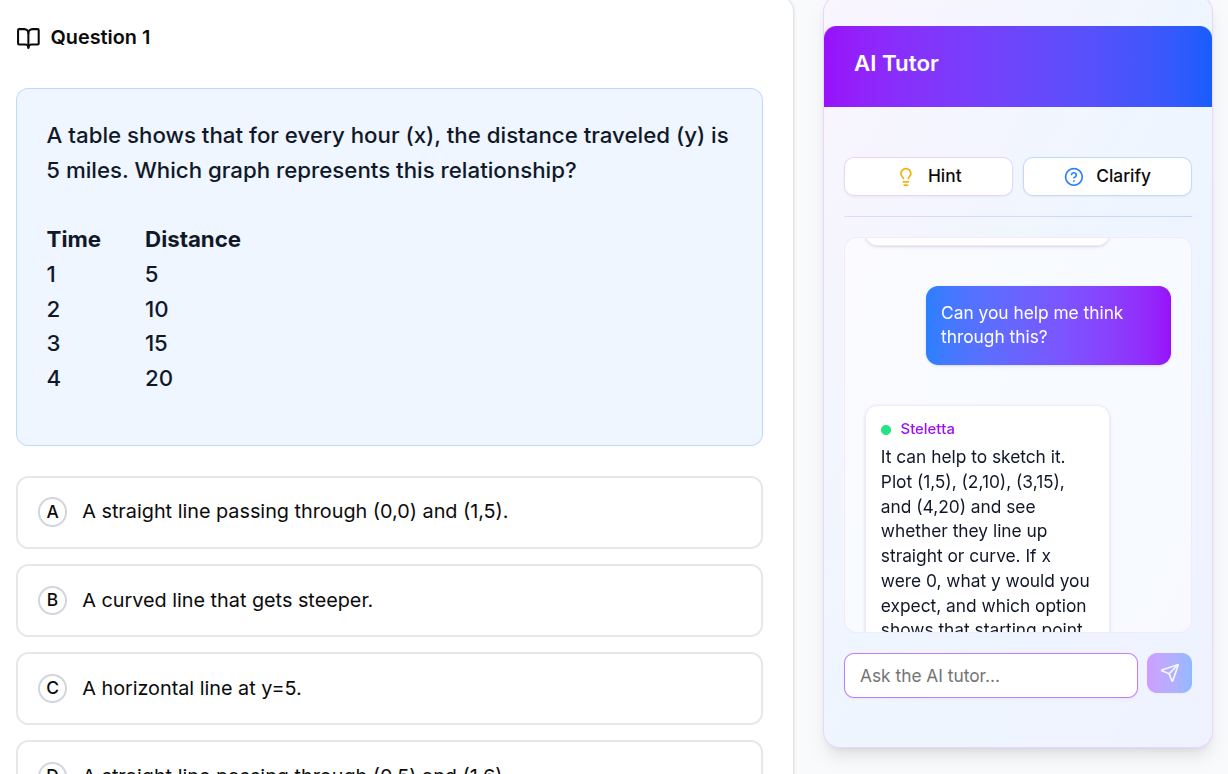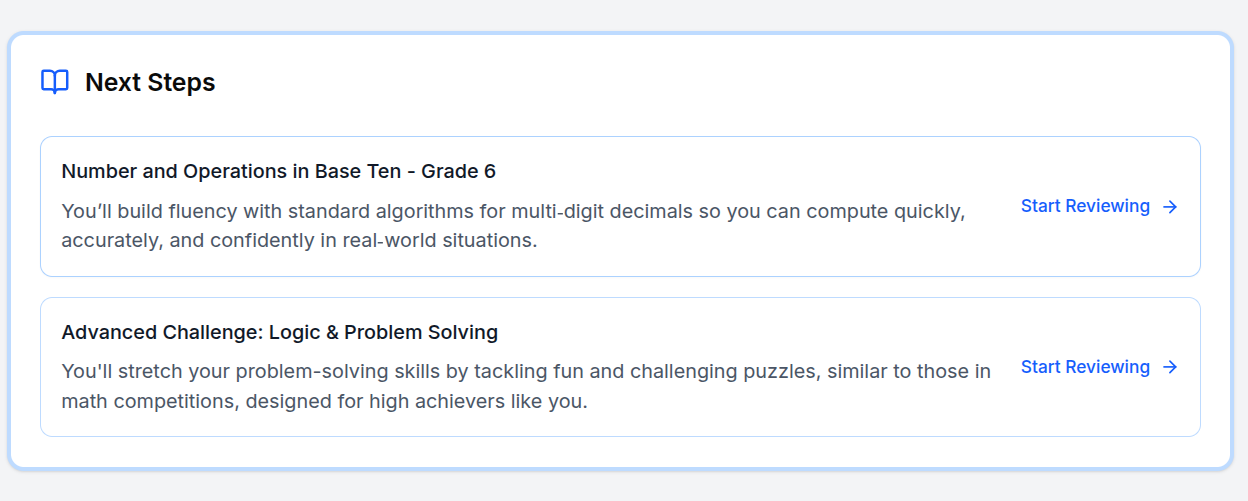Make Your K-8 Math
Test Day Feel Easy
The perfect preparation for adaptive tests like the NWEA MAP and STAR. Our AI selects the optimal next question, acts as your in-test tutor, and builds your personalized roadmap to a higher score
Proven Results
See the story of how 8 months of focused iteration led to extraordinary success
Steletta grew from a 2024 pilot with a single math club at a top Florida magnet middle school, quickly expanding by word of mouth to students at other leading schools
The adaptive algorithm and question database went through 8 months of tweaks and iterations based on their feedback, to optimize for learning speed without compromising on quality
Their incredible results on the Fall 2025 FAST scores proved the novel model works. Steletta is now open to students everywhere

Actual results from one of the pilot students
A perfect simulation of adaptive tests like NWEA MAP & STAR...
...enhanced by AI
A Smarter Way to Prepare for Test Day
AI helps you learn and understand concepts without cheating
- Clarifies confusing questions without giving answers
- Provides strategic hints to guide your thinking
- Explains concepts thoroughly after you submit an answer
- Unlocks in-depth reviews for every question in your test history


Discover your Learning Frontier. The fastest way to improve your score
After completing the test, you won't just get a score. The AI identifies your Zone of Proximal Development. We call it Learning Frontier and that's the precise edge of your current abilities where real learning happens
Always Challenged, Never Bored
Your personalized roadmap is built around one principle: keep you challenged, never bored. By focusing on your unique Learning Frontier, every exercise is challenging without being frustrating
The curriculum is truly uncapped. For the highest achievers, pushing the frontier means moving beyond standard K-8 material to tackle harder challenges like Math Olympiad problems

Test Prep Doesn't Have to Be Boring
Our smarter adaptive algorithm quickly identifies how to challenge you by analyzing insights from the AI Tutor, without wasting time on endless 2+2 type of problems before moving up
Tailored tools for your specific use case
Always stay on top: teacher dashboard for your classroom, parent summary, in-depth reports for homeschool evaluation, and much more
Empower Your Entire Classroom
- Boost standardized test scores for your classroom with AI that identifies and fills learning gaps before they impact performance
- Track every student growth in real time with proactive notifications and detailed analytics that show exactly where each student stands and what they need next
- Save hours by generating professional parent reports instantly with one click
Frequently Asked Questions
Before students submit the answer, it acts like a good teacher, asking guiding questions to help them work through the problem. After they answer, it's there to explain the concepts and show them why their answer was right or wrong. This is crucial because the moment a student is trying to solve a problem is the moment they are most motivated to learn. We leverage that peak interest to make learning more effective.
Let's put it this way: a student will never be more interested in learning what the mode is than right after they got a question about the mode and got it wrong!
1. High Engagement: Official standardized tests are well over 40 questions, but for a practice test without the adrenaline of a real test, this is way too much, leading to boredom and loss of focus. The shorter format keeps students engaged, leading to better performance.
2. Statistical Accuracy: A test shorter than 17 questions doesn't provide enough data points to identify foundational gaps (if any) and the Learning Frontier.
Our question bank contains over 1,000 expert-curated questions covering more than 200 unique Common Core math standards sub-topics, with at least 3 questions for each sub-topic.
Also, the algorithm knows the student's entire history, guaranteeing variety and making sure that over time they get tested on every relevant sub-topic.
Over time, this becomes a powerful cycle: the student takes the test → gets a personalized study plan based on their Learning Frontier → learns the most important new concepts → retakes the test → sees their score and Learning Frontier advance → repeat. As a student goes through this cycle a few times, their growth will be impressive. Even more considering the fact that the adaptive algorithm learns more about them after each test, making every subsequent plan even more effective.
Despite being shorter than an official standardized test, the RITAI score is quite accurate. This was tested by having our early adopter students take the test multiple times and checking the variance of the results. After 17 questions, the variance started dropping significantly, which is why we chose that as the minimum number of questions.
Furthermore, to make sure you get the full picture of a student's results, they also receive a confidence interval. This helps you understand how much of a score change is due to randomness versus actual learning.
Finally, as students take more tests, the RITAI will get more and more accurate. In statistical terms, collecting more data points lowers the variance.
1. Compliance Certified: Steletta is fully compliant with all federal student privacy laws, including FERPA and COPPA.
2. Official Clever Partner: We are an approved Clever partner, which means our application has passed Clever's extensive security review and technical vetting process.
3. Data Promise: Your school's data is yours alone. We have a strict policy that no student data is ever shared or used to train any AI models.
For a complete overview, you can review our full Privacy Policy and Terms of Service.
High Test Scores and Real Learning
Finally you can optimize for both at the same time